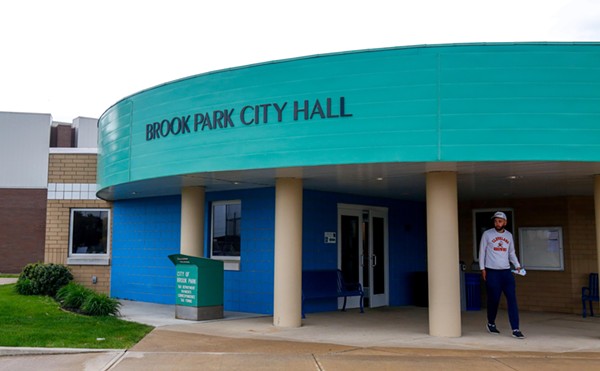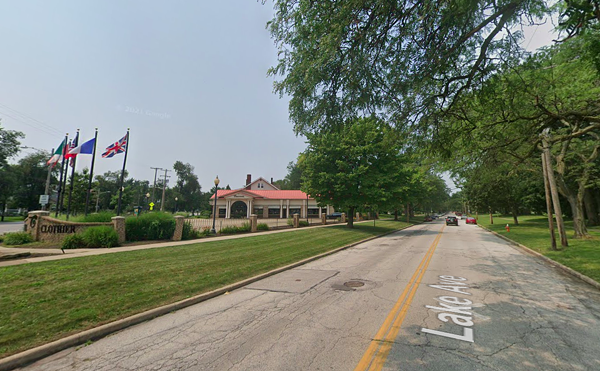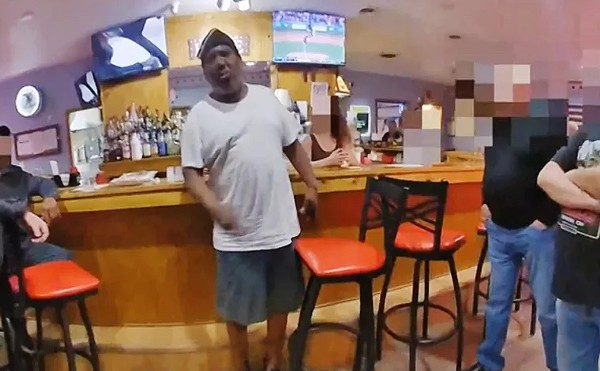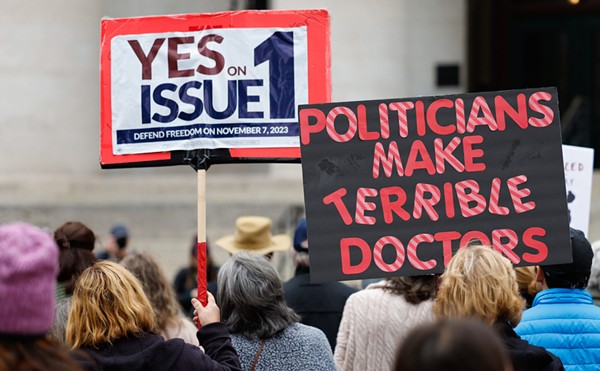Last summer, a Cleveland patrolman watched Majewski idling his pickup truck at West 83rd and Detroit. Two males approached the truck and made a hand-to-hand swap with the driver. The cop moved in, the two men fled, and a pair of rocks on the dashboard put Majewski where he is today: at Judge Timothy J. McGinty's mercy.
Majewski is 21 years old, but no stranger to the pound of a gavel. Two years ago, while a Marine stationed in Hawaii, he served a year in jail for robbing and sexually assaulting a prostitute.
Majewski's record tells of a thug and a druggie, a candidate primed for incarceration's humbles. But after his crack arrest, Majewski entered a 40-day drug rehabilitation center. He also moved back home with his mother and found work at Marc's. Impressed, McGinty sentences Majewski to two years' probation. Noting the admission to rehab, the judge says, "Without that, I would have sent you to prison."
When Majewski turns away from the bench, he is sobbing silently with relief. His mother and a couple of friends wrap him in tight hugs.
The judge's leniency may have been shaped by other events. On November 10, Majewski was arrested for a spree of robberies and attempted abductions at motels and apartment buildings in Strongsville, Parma, and Parma Heights. At one of the motels, Majewski raped the 57-year-old caretaker, police alleged.
Majewski was held in jail for 65 days on "this other matter," as Judge McGinty puts it. But he was cleared of all crimes related to the spree when his DNA didn't match a sample taken from the rape victim.
Outside the courtroom, Majewski can barely contain his delight. As he waits for his lawyer to tidy up the paperwork, he jokes with a sheriff's deputy, playfully extending his wrists and offering himself for handcuffs.
"One more time, for old time's sake?" he asks.
The doorbell, which runs from the Village Motel office to the owners' on-site residence, rang 20 minutes after midnight on October 29. Jim Shepard and his wife, Ava, have owned the motel for 10 years. Jim also has a job at PPG Industries, and the motel affords Ava a place to work and watch their two children. "It's so perfect," Ava says in the chunky English of one who emigrated from Poland in 1977. "It cannot be any better."
The Village is one of a half-dozen $35-a-nighters on Pearl Road in Strongsville. Clean but spare rooms are rented by the day or week to visiting construction workers, locals between apartments, and husbands who've been kicked out of the house. The parking lot sees its share of popped hoods and filter changes.
That October night, Jim Shepard walked across the parking lot to the office to answer the bell. A midsize American car with a rear spoiler was parked near the door. "I've gotten a little careless," Shepard says. "He had his car backed in, and that should have tipped me off right there."
When he entered the office, Shepard was greeted by a young man -- mid-20s, stocky build, clean-shaven, normal-looking -- wearing a waist-length leather coat and a ballcap. The man asked Shepard for a room. The only vacant unit was reserved, but at this time of night, Shepard figured the guest for a no-show. He walked around the man to reach the other side of the counter. When Shepard turned, he was staring at a small gray handgun.
The man asked Shepard for the money. Shepard told him he didn't keep any in the office; he carries just enough cash to break a $50. He handed the man his nylon wallet, containing all of $15.
"I'll move out of the way if you want to check," Shepard told the gunman, stepping back from the counter.
The robber ordered Shepard to lie face down. More out of fear than defiance, Shepard stayed on his feet. He worried that the man might plug a bullet into the back of his skull if he turned away. But there was no argument. The man hurried out the door and into his vehicle. Shepard tried to make out the car's license plate number as it drove off into the night, but could not.
Had Shepard been able to get a better look at the tag, a string of attacks in the southwestern suburbs might have ended with his wallet.
At 6 a.m. on Halloween, Detective Michael Klein arrived at the Parma Justice Center. Forty minutes before Klein reported for duty, Mary Jones's husband called 911 to say that a man had tried to rob and abduct his wife.
Jones was returning home after working the third shift. She remembered headlights following her into the parking lot of Parmatown Towers Apartments, but didn't think much of it until a red car, possibly a Chevy Cavalier, pulled into the space next to hers.
"Hey!" the man yelled to Jones as she walked to the apartment building.
She kept moving.
"I said, 'Hey, you!'"
She kept moving.
Then she felt something poking underneath her right armpit.
"You see this?" the voice behind her asked. Jones turned and shuddered at the sight of a silver handgun. The man holding it wore a ballcap. His eyes were droopy, his face pudgy.
"Who lives in your apartment?" the man asked. Jones told him she lived with her husband and daughter.
"You're taking me there to kill you," the man said.
But the assailant, perhaps spooked by the prospect of a confrontation with Jones's husband, quickly changed his plans and asked for her purse. She told him she didn't have any money. He then told her to walk back to his car. Instead, she moved toward her building. Keep breathing, she told herself. You're almost there.
Jones made it to the building, then to her husband's arms. Officers responded swiftly to the 911 call, but the man was gone by the time they arrived.
Soon after, Parma Heights police called Parma dispatch to share news of an incident on York Road. At 5:45 a.m., a man confronted a woman outside her apartment. The Parma Heights attack was a copy of the one in Parma: White male. Chubby face. Chevy Cavalier. Gray handgun. Demands for money. Orders to get in his car. And another successful escape by the victim.
Yet the failed abductions would take on a whole new texture when Strongsville police sent out a grim teletype: Earlier that same morning, the 57-year-old caretaker at the Colony Motel had been robbed and raped by a pistol-wielding man in his 20s.
The man first asked the clerk about vacancies and, during the conversation, learned she was alone. The man left, but soon returned, pistol drawn.
After ordering her into her residence, which adjoins the motel office, he demanded she remove her clothes and perform oral sex on him. She told him she would throw up. He directed her to lay down, then put a blanket over her face. Then he raped her. The woman says he was calm, even casual, and asked if she had any cigarettes or pot after violating her on the bed. "I called him the 'gentleman rapist,'" she says.
She was most afraid after the rape, when he ordered her to lie face down for three minutes. "That's when I thought my life was over," she says. Instead of killing her, the man took the money on the nightstand -- $2 and some change -- and left.
"Right from the start, we thought it was the same guy," Detective Klein says.
He figured the suspect to be experienced. According to the victims, the robber was calm and measured. Amateurs handle pistols the way symphony conductors wave batons, but even during the rape, the suspect behaved matter-of-factly. "This guy knew he was in control, and he handled it, for the lack of a better term, professionally," Klein says.
But he was desperate. He hadn't bothered to conceal his face, not even during the Colony Motel attack, suggesting a criminal who knows it won't be long before he's captured. "They figure they have nothing to lose," Klein says.
If he was experienced, Klein thought, he had likely been through the system a time or two. Thinking along similar lines, Parma Heights detectives went downtown to lift names and faces from the sex-offender registry at the sheriff's office. They retrieved 15 shots of men who might resemble the man witnesses described. Klein also put together his own list of suspects. A few names came from tips. Strongsville, Parma, and Parma Heights police received hundreds of calls, but tipsters traditionally provide vague information -- I once went to school with a guy whose brother . . . -- that is difficult to follow up on.
Parma Heights got the first hit. Carmen Comsulea, the nursing-home worker who was attacked outside of her York Road apartment, identified a suspect from the stack of three-by-three-inch, black-and-white photographs. The man she picked was a former Marine who two years before had assaulted a prostitute in Hawaii.
After Parma Heights police told him about their suspect, Klein inserted Majewski's picture into a photo lineup. Jones picked him out as well.
After serving time for assaulting the prostitute in Hawaii, Jerry Majewski moved back to Cleveland in August 1999. When he wasn't delivering pizzas, he was drinking. His life was going nowhere, but he kept a roof over his head. Then a friend introduced him to crack last summer.
"After that first hit," Majewski says, "I stopped paying my bills, I quit calling my friends. I worked, but just to buy the stuff."
Crackheads speak of their addiction as a futile chase to recapture that exhilarating first high. Majewski was instantly hooked. Most days he didn't go to bed before 6 a.m. At home, he'd see his mother's phone number on the caller ID, but couldn't bring himself to pick up the receiver and betray his condition.
Within two months of his first hit, the police arrested him for possession. Spooked by his life's hard swerve toward the gutter, he sought help through an outpatient treatment program. Just go to work and go home, he'd tell himself, hopeful he could beat back the demon. But when his delivery shift ended, he found himself in the bars and on street corners that peddled crack.
His addiction needed to be addressed full-time. On October 4, Majewski entered Casa Alma, a residential treatment center on Fulton Road. The program took hold. At the urging of counselors, he had shaved his goatee and removed his earrings. He agreed that his appearance should match his recently cleansed spirit. By Friday, November 10, Majewski had but two more days of treatment to complete. A lasagna dinner with his family was planned for the evening of his release.
That Friday, Majewski and fellow Casa Alma patients watched police cars collect outside the building. "Okay," Majewski joked, "who's got charges still against them?"
A van was leaving the treatment center to take a group of residents to an AA meeting. As Majewski exited the building to get into the van, one detective in the swarm of police pointed to him and said, "You."
A stunned Majewski was cuffed and placed inside a cruiser. His mind reeled. "I was just confused," he says. "I was trying to be patient. I was trying to remember something in my past, but I couldn't remember anything."
Majewski was interviewed by Klein and Parma Heights Detective Jeff Krepina. Majewski says the detectives played good cop/bad cop, with Krepina the heavy and Klein the soft touch. Convinced of his innocence, Majewski was a little cocky during the 20-minute interview. After all, hadn't the robberies they spoke of been committed while he was in Casa Alma? Chevy Cavalier? He didn't even own a car, having sold his truck before he went into rehab. He volunteered to take lie-detector and DNA tests. Surely, he thought, the detectives would realize he was the wrong man. "I thought I'd be out of there that night."
Instead he was charged with the aggravated robberies of Jones and Comsulea. After the interview, Majewski was placed in a holding cell. Throughout the night, the officers on duty strolled by his cell for a glimpse of the caged bird. "Each one came back and gave me a look and a little smirk," Majewski says.
Strongsville Detective Mike McCarthy learned that Parma Heights had arrested Majewski from a friend who saw it on the news. McCarthy had shown Majewski's photo to his victims, Village Motel owner Jim Shepard and the Colony Motel desk clerk who was raped. Neither could say for certain that he was the man. But while McCarthy was away from the office, Shepard and the woman left messages on his voice mail. "Once he was shown on the news, both said, 'That's the guy,'" according to McCarthy.
Parma Heights may have made the arrest (Krepina and Parma Heights Chief Mike Mlecik declined to comment for this story), but Strongsville had physical evidence: semen collected from the rape victim. Strongsville police picked up Majewski, who had been moved to North Royalton's larger jail, and drove him to Southwest General Health Center for testing. McCarthy remembers Majewski as being cooperative and polite. "I'm sure he knew this was going to vindicate him or prove him guilty." Majewski only remembers the shame of being led through a hospital in an orange jumpsuit and manacles.
The case against Majewski looked solid. The four victims all pegged him as the assailant. He had a sex-and-robbery conviction in his past and a recent drug arrest. Before joining the Marines, he had lived with his mother in Parmatown Apartments, where Jones was assaulted. And when detectives first called Majewski's house, his mother mistakenly told them he had been at Casa Alma since November 1 -- after the Halloween robbery spree. "I was panicked, telling them there was no possible way it was him," his mother says.
She later called Krepina back to say she had the date wrong on his admission to Casa Alma, but her initial slip cost her credibility with the detective.
Klein believed Majewski was the assailant, especially given the August crack arrest. "I'm thinking, maybe he's on the downslide. Either he's quit his job or he wasn't working."
Moreover, the robberies had stopped.
But for a dead-to-rights suspect, Majewski was adamant about his alibi. He allowed Casa Alma to release his records. His mother retained attorney Paul B. Daiker, who went to work to establish Majewski's alibi. Daiker obtained a letter from Casa Alma's treatment director, Ivan Rosa, that said Majewski was a resident from October 4 until the night he was arrested.
It is here the investigation apparently broke down. Daiker gave the letter to police, the prosecutor, and the judge at Majewski's arraignment the Monday after he was arrested. While the letter described Casa Alma's policy of discharging residents who leave the facility unsupervised, it did not provide any direct evidence that Majewski was at Casa Alma when the crimes were committed.
Klein got a warrant to search Casa Alma, ostensibly for the handgun, but the detective really wanted documents that showed -- or didn't show -- Majewski's whereabouts when the crimes were committed. "What we were hoping for was a roster or bedroom checks, something where someone put his initials by his name," Klein says.
Citing federal patient-confidentiality rules, Casa Alma was reluctant to honor the search warrant, even with Majewski's signed release. (Rosa wouldn't speak to Scene, and Executive Director Miguel Prieto was too ill to return calls, according to his secretary.) In hindsight, the treatment center's forthrightness could have greatly helped Majewski; in practice, the medical profession errs on the side of caution when patient information is in play.
Three days later, Casa Alma released Majewski's file to investigators. Klein says he was "pretty unimpressed" with what Casa Alma provided. The file was thin, beyond the records of Majewski's initial evaluation and intake. "As far as they were concerned," Klein says, "the records spoke for themselves." Suspicion was further aroused by a gap in Majewski's record of AA meetings that corresponded in time with the crimes. Majewski explained that he attended meetings where there was no sign-in policy.
Daiker, however, contends police weren't eager to search for evidence that exonerated his client. "My problem with the case is from the beginning, and [the police] not listening to him and listening to me and looking at the documentation."
Rosa's letter did say Casa Alma monitors performed bed checks, but Klein says he discovered the night watch kept a log only after the DNA results came back from the lab. "They told us they had a monitor," Klein says, "but they never told us they had a log."
Majewski was indicted by a grand jury November 21 and held at the Cuyahoga County Jail on $1 million bond. His system shouldn't have been shocked by confinement. Since graduating high school, Majewski had been in the Marines, jail, drug treatment, and now jail again.
"Jerry was very patient throughout this process, more than a lot of people would have been," Daiker says. He had the tools of recovery now. And the Serenity Prayer, the mantra of the recovering addict, spoke clearly to the situation he now encountered: God, grant me the serenity to accept the things I cannot change . . .
In jail, Majewski passed the days with television, cards, basketball, suspense novels, and sleep. None of his cellmates knew his charges included the rape of a 57-year-old woman, and he kept it that way. Time passed well enough during the day, but at night he lay awake on his thin mattress (no pillow) for hours, wondering how this could have happened. The woman he was dating disappeared from his life.
Meantime, his mother, never doubting his innocence, took a second job to pay the lawyer bills. "He had problems in his past, but it had nothing to do with these crimes," she says. She also paid for the lie-detector test, which he passed.
"I told Jerry, 'This is why I'm a criminal defense attorney,'" Daiker says. "Sometimes you get cases where you're convinced your client is not guilty, and this was one of them."
When the DNA results were about to be known, Majewski's mother asked her son if he was excited. Not really, he told her; I know what they're going to say.
"Holy shit!" That was Detective Klein's reaction when he learned the test results backed Majewski's claims of innocence. "This poor kid's been sitting in jail."
Majewski wasn't released immediately, however. If he wasn't guilty of the rape, police wanted to make sure he didn't commit the other crimes. Klein says he reinterviewed the victims and remained convinced they were attacked by one man. "You'd have to be a total moron not to think it's the same guy."
One lesson learned from the host of convictions overturned by DNA is the unreliability of witnesses. A study of 63 wrongful convictions undone by DNA revealed that 53 involved faulty witness identification.
An experiment conducted by a psychologist at Iowa State University echoes these findings. Gary Wells staged a theft where the witnesses got a good look at the perpetrator. Later, Wells presented the 200 witnesses a "six-pack," cop talk for a photo lineup of six suspects. (Police use photo lineups much more often than the live ones depicted in television dramas.) Half the witnesses were shown a six-pack with the real "criminal." Fifty-four picked out the right one, 21 said the perpetrator wasn't there, and the rest selected someone different from the actual perpetrator.
The other 100 witnesses were shown a six-pack minus the picture of the real criminal. Thirty-two picked no one, but the rest -- wrongly -- chose a face out of the lineup. In other words, two out of three witnesses were willing to finger someone who didn't commit the crime.
"Thank goodness DNA has come along, but most cannot afford it," says Cuyahoga County Public Defender James Draper. He sees problems when witnesses try to identify a suspect of another race and when overeager police "suggest" the best choice. "I don't believe any conviction ought to stand on eyewitness testimony alone," Draper says.
Klein says he used color photographs for his lineup, made sure the backdrops matched and that the candidates bore a passing resemblance to each other. Given the results of Wells's experiment, it's likely Comsulea and Jones picked Majewski simply because he looked the most like their attacker.
Yet Majewski looks only a little like the man with the hooded eyes in police drawings. He carries extra weight, and his head is as big as a watermelon. His light brown hair is cut short, and he's of an age that his glance can change from innocent to threatening with just a turn of the mouth. But his features aren't sagged by jowls, like the face described by witnesses.
Tom Rein, the Cuyahoga County assistant prosecutor in charge of the case, says he has never seen four witnesses simultaneously mistake the identity of a perpetrator. But he notes that Shepard and the Colony Motel attendant were staring down a gun barrel -- quite a distraction -- and that Jones and Comsulea were approached before 6 a.m., when it was still dark.
Initially, Shepard and the Colony Motel rape victim did not identify Majewski. "I looked at so many pictures, it wasn't even funny," Shepard says. He told detectives it could have been two men -- one of them being Majewski. As for his identification of Majewski on television, Shepard still has trouble believing he's not the guy. "If it's not him, it looks like someone just like him."
Like Shepard, the rape victim looked at stacks of photos before watching the news report and fingering Majewski as the attacker. She felt sure the brief glance she got of Majewski on television paired with her recollection of the attack, but now admits to being less certain. "I thought he was too young, but he did look like the guy."
The victim says the horror of the attack clouded her memory. She remembers a stocky build, a round face, dark hair, possibly a mustache, but had trouble putting the face together, à la Mr. Potato Head, from the choices of noses, mouths, and chins in the police composite book. The drawing she keeps behind the counter is not the one she created with the help of police, but one imagined three months later by a woman who was attacked outside her apartment in North Royalton.
Indeed, this mystery didn't end at Halloween. Around 3 a.m. on February 17, a woman returning from a night in the Flats was attacked by a stocky, clean-shaven white man outside her apartment in North Royalton. The next morning, a short, round-faced man driving a car with a rear spoiler tried to rob the Plaza Motel on Pearl Road. Less than an hour later, a Strongsville woman was threatened by a fat-faced white male driving a red car. He demanded her purse and information on who was in her apartment.
The only significant difference between these crimes and the ones committed in October was the weapon used: a knife, not a gun. Police are working from the theory that all seven victims -- four in Strongsville, one in Parma, one in Parma Heights, and one in North Royalton -- will eventually identify the same man.
If he could be found.
Parma Detective Klein is sticking to his notion that the suspect lives on the southwest side. He compares the spree to a game of playground tag, where the bad guy makes it to safety every time. "What's frustrating me, if it is a local guy, someone knows him," Klein says. "They just don't know they know."
Police reports paint a blurry sketch of the suspect's motives. Is he driven by rape or robbery? At some encounters, he asks for money first; at others, he demands the woman accompany him somewhere, be it her apartment or his car. Two of three motel attendants he attempted to rob were men, but both had wives who lived and worked on-site. "Primarily, I think it's money," Klein says. "But he'll take the opportunity when it presents itself." If robbery is first on his agenda, he's horribly unskilled at the craft. His cumulative take thus far: less than $18.
"My only comment is, this person is a very dangerous individual," Rein says. "He's compulsive and impulsive."
Tips continue to float in, but police believe the best evidence will be provided by a crime yet to be committed. "If we're in a cooling-out period, I don't think it will last for long," North Royalton Detective Dave Loeding says. "I think there's a mistake to be made."
"He's looking at his options," Paul Daiker says, when asked if Majewski is planning a lawsuit. "Let's leave it at that."
If his client sues, Daiker won't be able to argue Majewski's picture was pulled from a hat. He was a convicted sex offender whose parole oversight had been transferred to Cuyahoga County. But Daiker believes Majewski's past did more than put his name in the police's mix of possible suspects. "What happened in Hawaii is what convinced them they had the right person," Daiker says.
Majewski says he won't talk about Hawaii, since what happened there makes him no less innocent of the crimes here. But his incarceration does seem to have broadened his shoulders. The morning after his release from the Cuyahoga County Jail, he went to an AA meeting. He attends six a week, though the court requires only two. "Jerry's someone who takes care of business now," Daiker says. "I don't know that that could have been said before."
"I love so much to lay in bed and have a pillow," Majewski says. His job at Marc's, stocking the dairy case, pays $6.25 an hour. He knows it's not important work, but any job well done is gratifying.
Shortly after the prosecutor dropped the charges, Majewski ran into one of the cops at BW-3, where he likes to eat wings and play the trivia game. They had a cordial exchange. The woman who left him when he was accused recently told him, "Well, I guess you were innocent." He couldn't believe she had the nerve to say anything; they have not reconciled.
Meanwhile, as Majewski rotates the dairy stock and thinks of his future, police sift through leads and wait for the real robber-rapist to make a mistake. "What's going to happen next?" asks Detective Loeding. "Does someone have to die?"
After the rape, the caretaker of the Colony Motel was too terrified to take her daily stroll to the Dairy Mart. That fear has passed, but she still trembles when a red car pulls into the lot. "It's a hard thing to get over," she says. "I don't know that I ever will."












